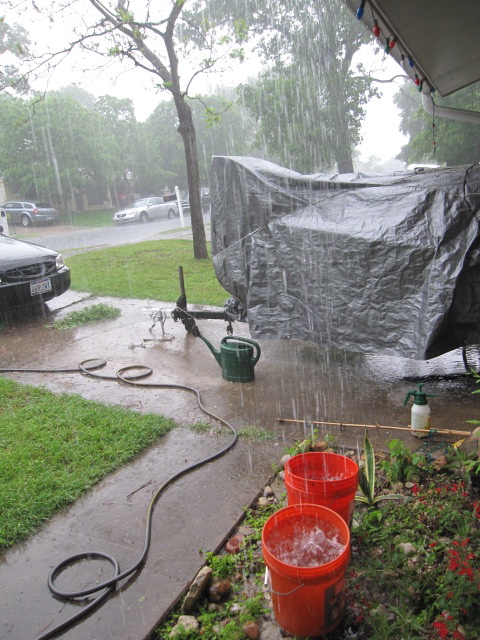Water Deeply: A brief and shallow watering is great for newly planted seeds or tiny seedlings, but once your plants' roots are really developing they need deep, infrequent waterings. By watering deeply and less often, your plants will be encouraged to send long tap roots out into the soil and mine it for water and nutrients. A larger, healthier root system is the key to a large, healthy plant that can bear lots of delicious fruit. Shallow waterings can pass during cooler months, but once the hot Summer hits, any plants that are used to shallow, frequent waterings will dry out quickly and suffer from heat stress. Penetrating the soil with water also conserves water. Shallow waterings dry out quickly in the sun and wind, but water deep in the soil will remain much longer to quench the thirst of your veggies and other plants. Those deep, established tap roots will be able to suck up water hiding down in the soil, allowing you to water much less often and conserve the most water.
Keep it off the Leaves: Water is essential to the life of all things, but it can also be a disease spreader. Cucurbits and other plants are particularly susceptible to powdery mildew and other diseases caused by too much water on the foliage. By using drip or soaking irrigation, you can keep the water at the roots where it's needed and off of leaves where it can attract pests, spread disease, and even burn the foliage by magnifying the sun.
Automate: As we mentioned in our 'top ten tips' post, automating your irrigation system can be a real life saver. A good timer costs around $38, but will save you lots of pain, suffering, and accidentally high water bills. No more 'woops i left the sprinkler on for 5 hours' or 'my neighbor forgot to water the tomatoes while i was gone and now my prize winners are shrivelled and dead.' A timer hooked up to a trenched irrigation system can get all your watering done for you at one time with little thought needed from you. Once you've set the time and the watering schedule you'll only have a few things to do to keep things running smoothly: Remember to turn the timer off if you're in a rainy season and to adjust the frequency of the waterings depending on the seasons. Flush the system occasionally to rid the drip hoses of any built up debris (this is usually as easy as removing connection at the end of the hose and allowing the water to flow through for several minutes). Check for leaks or other damage every few weeks.
 |
| When it rains, it sometimes pours. April 17th 2010 - wish we could have some of that rain in 2011! |
Capture the Rain: Vegetables and most plants prefer rain to our city's lovely treated water (chloromine does not evaporate like chlorine does, and it's none too good for the health of vegetables.) I try to use rain water as often as possible when watering my own gardens, but am limited to one rain barrel and a very dry Spring. The City does offer a rebate for utility customers who invest in rain barrels, so take advantage of that if you can. Rain barrels can be very expensive, but they can also be close to free: find any food grade barrel, fit it with a spigot near the bottom and a screened lid and you've got yourself a rain barrel! Pickle barrels are great, but be sure to know exactly what was in the barrels you get - you don't want something that once held crude oil or toxic chemicals that will leach into your water. Ideally a series of rainbarrels is the best- connect several together with hoses near the top of the barrel and spigots at the bottom of each. (Well placed buckets are good for those sudden deluges we tend to get). I've been lucky in some seasons to water my vegetables with ONLY rain water: and it made a huge difference in the health of the plants and the quality of the harvest. It does take much longer to water an entire garden by hand, picture lots and lots of walking back and forth with the watering can, but if you have the time it's a great workout and excellent for the health of your plants.
Proper watering can make a real difference in the yield of your harvests. Seedlings that are left to dry out too many times may never mature into healthy plants, jalapenos that are kept overly moist at all times will never get prize winnning heat, and cucumbers gone dry will become bitter and repulsively inedible. Find the balance, find a system that works with your lifestyle, pay attention to the weather and enjoy the fruits of your labor! Contact us if you'd like a new irrigation system installed: affordable, underground, timer equipped!

No comments:
Post a Comment
Thank you so much for your feedback, especially if you've cooked one of my recipes or tried one of my tips: let me know how it turned out!